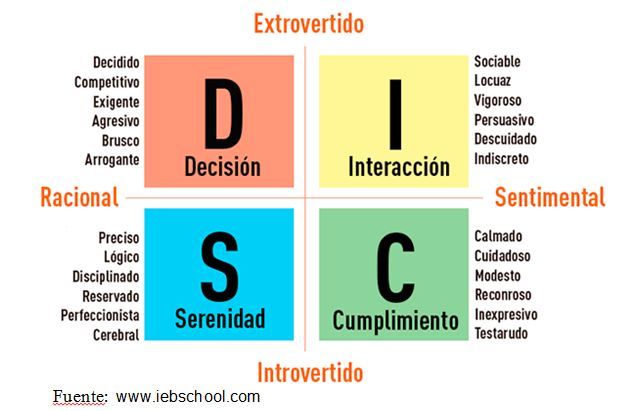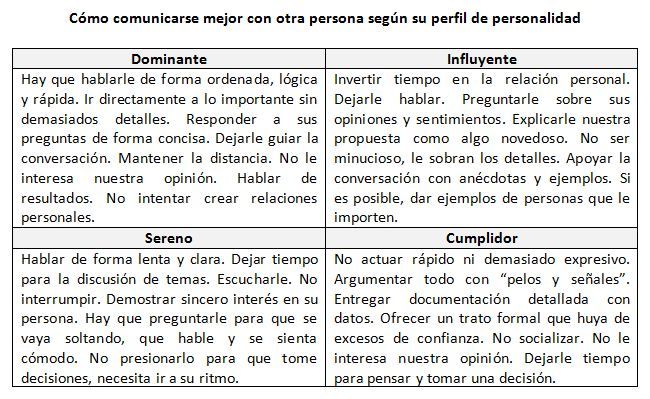DISC methodology and its usefulness for real estate agents
Do we communicate in the same way with everyone? If each person is different, do we know how to adapt our way of communicating to each interlocutor?
In recent years, the job of an estate agent has changed a great deal, as have most professions. The technological change in which we are immersed affects absolutely all of us. However, the real estate profession retains the charm of being basically a work of people, for people and between people. In any interpersonal relationship, communication, the ability to make oneself understood and to understand the interlocutor, is of particular importance.
If you think about it, the challenge is exciting: to adapt your communication to the person in front of you, whom you have just met and about whom you have no previous information. Don't suffer, because it is possible and there are methods to achieve it.
A fabulous tool for moving in this direction is the methodology DISC (Decision, Interaction, Serenity, CThe first version of this theory was developed in 1956 by the American psychologist Walter Clarke on the basis of a theory developed by his colleague Walter Clarke. William M. Marston. This methodology studies the external manifestation of our attitudes and moods, that is, our behaviour in different situations when we relate to other people.
The real estate profession is basically a work of people, for people and between people. Knowing that each person is different, we must adapt our way of communicating to each interlocutor.
The DISC methodology is a tool for assessing people's behaviour and emotions according to four personality traits:
- How we make decisions in the face of challenges.
- How we relate to others.
- How we react to change.
- How well we comply with rules and procedures.
The DISC method achieves the following:
- Identify behavioural styles.
- Increase our self-awareness.
- Improve our understanding of others.
- To make ourselves better understood.
Through a test of 28 items, each one consisting of 4 statements from which the person must choose which one he/she identifies with more and which one less, it is possible to know what the predominant profile of his/her personality is. There are 4 personality profiles or behavioural patterns that are obtained by associating the results with these personality factors: extroversion, introversion, rationality and emotionality. The DISC theory describes some typical traits of each profile and, although we manifest ourselves differently depending on many circumstances (the situation, the context, who we are with...), one of these behaviour patterns predominates in us.

(D) Dominant or decisive (extroverted people with rational behaviour)
They tend to be people who like to "cut to the chase" and avoid beating around the bush, they are very self-confident and are clear about what they want. They hate wasting time. They do not talk for the sake of talking, they do it to show their opinion or to ask what they are interested in knowing because it is important to them. They are not interested in establishing a personal bond. Their tone of voice is usually loud and confident. Their body language is stiff and they rarely gesticulate.
(I) Influencers (extroverted people with an emotional behaviour)
They are above all sociable people, they love interpersonal relationships, they feel comfortable in any social event because they are easy to communicate, they talk a lot, they smile easily and they make jokes. They are not at all discreet, they openly tell details related to their emotions, what they like... They tell personal anecdotes and are amusing. They are enthusiastic and optimistic. Their pace of speech is very fast and they gesticulate a lot, both physically and facially.
(S) Serene or stable (introverted people with emotional behaviour)
People with this personality profile tend to show a certain shyness, they are not very talkative when they are not in their personal and physical environment of trust. They are friendly, patient, distrustful, not very open to change and with a traditional touch. Their voice volume tends to be low and their pace of speech slow. They do not express their emotions. They gesticulate little, basically with their hands.
(C) Compliant or meticulous (introverted people with rational behaviour)
They are analytical people who base their decisions on logic. They need information, like data and ask a lot of questions about details. They are perfectionists. They are generally distrustful, do not like changes and are discreet, do not give information about what they are really thinking and, of course, do not show their feelings. Their tone of voice is direct and confident. Their body language is not very expressive, they show rigidity, do not seek physical contact and keep their distance from their interlocutor. Facially they are inexpressive.
Obviously, we cannot ask anyone to take the test or ask what their predominant profile is, but we can develop our observation skills. We must pay attention to observable aspects of behaviour that give us clues about the profile of the interlocutor: tone and volume of voice, verbal rhythm, body language and the emotion or rationality shown in their words.
Once we have identified their behavioural model, the objective is to adapt to the style of communication that our interlocutor demands, the one with which they will feel more comfortable, with which we will be able to understand them better and make ourselves better understood.

The DISC methodology is a very useful tool in our profession as real estate agents, but it is equally valid for anyone's private sphere. We should all aspire to communicate better. We know that most of our problems with other people have their origin in some misunderstanding or miscommunication. As more and more time is spent in schools teaching how to live and not just acquiring knowledge, it is quite possible that communication skills will be part of their content in the near future, and then perhaps DISC methodology will be a key subject.





